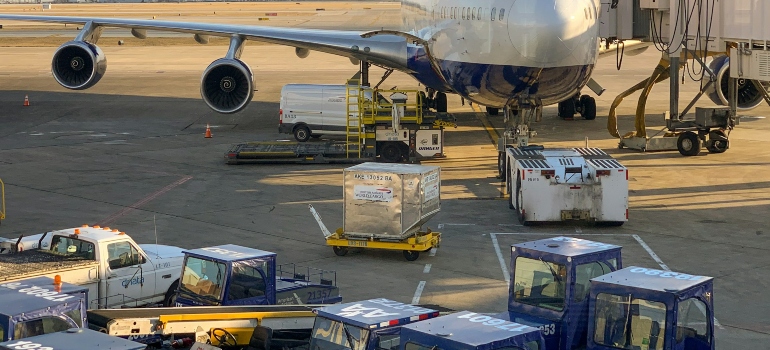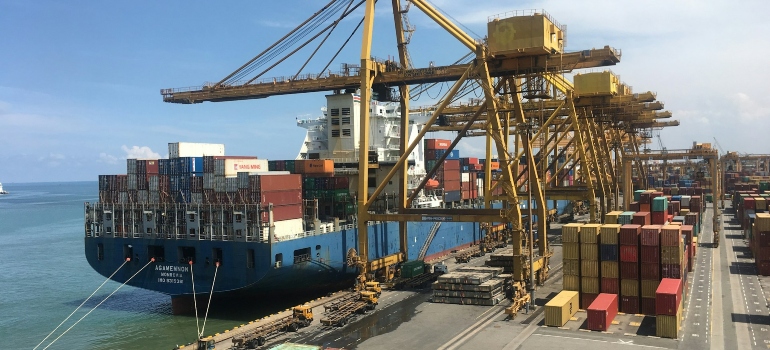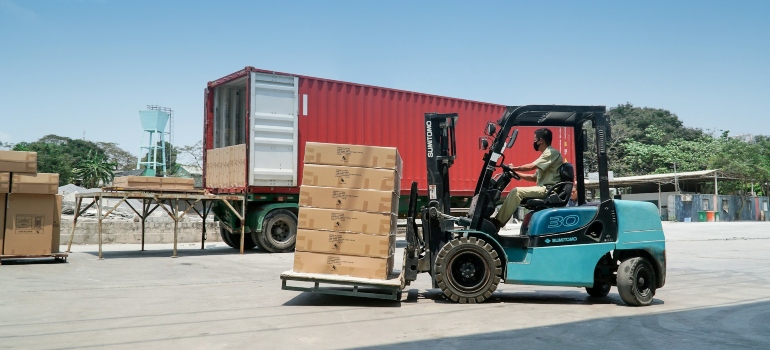The Pros and Cons of Air Cargo Shipping
Air cargo shipping is a critical element within the global logistics and supply chain, enabling the rapid and efficient transport of goods across great distances. This transportation mode is essential for industries that rely on the quick delivery of perishable goods, high-value products, or time-sensitive materials. It also enhances the responsiveness of supply chains to market demands and emergencies by facilitating faster market access, making it an invaluable asset for global trade. As businesses strive to manage the complexities of international commerce with the help of Peasley Moving & Storage, a thorough understanding of the pros and cons of air cargo shipping is crucial for effective strategic planning and operational efficiency.
The Pros of Air Cargo Shipping
As a business owner or logistics manager, you are constantly seeking ways to enhance your operational efficiency and effectively meet market demands. Air cargo shipping presents several compelling advantages that can significantly benefit your business. Below, we detail the key benefits that make air freight an attractive option for various industries.
- Speed: The fastest way to move goods over long distances, crucial for urgent deliveries.
- Reliability: Highly dependable schedules minimize the risk of delays.
- Global Reach: Access nearly any destination worldwide where there is an airport.
- Security: Stringent security measures reduce the risk of theft and damage.
- Less Packaging Required: Reduced need for heavy packaging lowers both costs and environmental impact.
- Lower Inventory Costs: Quicker transport times support just-in-time inventory strategies.
- Reduced Risk of Damage: Air freight’s swift journey means less handling and, consequently, fewer chances for damage.
Leveraging these advantages, you can streamline your shipping processes. Moreover, you can enhance customer satisfaction through faster and more reliable services. Carefully considering each benefit allows you to align them with your strategic business objectives and logistical needs.
Transit Speed
Air cargo is renowned for providing the fastest transit times among all shipping modes. This rapid pace is critical for transporting either time-sensitive or perishable goods. For example, medical supplies such as vaccines require swift delivery to maintain their efficacy, making medical equipment shipping services an indispensable choice.
Similarly, perishable goods like fresh fruits, flowers, and seafood must reach markets quickly to preserve freshness and quality. The ability of air cargo to connect distant parts of the globe in a matter of hours rather than days or weeks offers businesses the agility to meet tight delivery schedules and respond promptly to customer demands.

Reliability Benefits
The reliability of air cargo is another significant benefit. Airline flight schedules are generally consistent and less susceptible to the day-to-day fluctuations seen in other modes of transport, such as maritime or ground shipping. For instance, sea freight can face delays due to port congestion, customs delays, or unpredictable weather conditions.
In contrast, air freight routes are more straightforward and less likely to encounter such disruptions, making it a dependable option for businesses that require certainty in delivery times. This predictability is particularly valuable in industries like automotive or manufacturing, where production lines depend on the timely arrival of critical components to avoid costly disruptions.
Global Reach
Air cargo significantly broadens the reach of businesses, allowing them to access almost any global destination with an airport. The extensive reach is vital for companies looking to expand into new and emerging markets. It facilitates the exploration of new business opportunities and enables firms to tap into international customer bases easily.
Moreover, air cargo’s ability to connect remote and underserved regions to major economic centers empowers smaller businesses to participate in global trade, leveling the playing field and fostering economic growth in less-developed areas. The global reach of air freight thus provides a critical infrastructure for international commerce, supporting business expansion and global connectivity.
Security Considerations
Air cargo shipping benefits from enhanced security measures compared to other shipping methods. Airports enforce strict security protocols that include thorough checks of cargo at multiple points, surveillance, and restricted access to cargo areas. These stringent measures significantly reduce the risk of theft and tampering. For high-value items like electronics, jewelry, or pharmaceuticals, the secure environment offered by air freight is crucial. Businesses can rest assured that their valuable shipments are protected, minimizing potential losses and maintaining trust with their customers.
Less Packaging Required
Understanding the pros and cons of air cargo shipping is vital when evaluating its suitability for your business needs, notably the reduced need for heavy packaging. Because air transport is less subject to rough handling compared to ocean and ground shipping, the packaging can be lighter and less bulky.
Such reduction not only decreases material costs but also lowers shipping weight, which can lead to savings on shipping costs with freight shipping Boise offers. Furthermore, using less packaging material is more environmentally friendly, aligning with the growing emphasis on sustainability in business operations. Companies looking to enhance their green credentials while cutting costs find this aspect particularly beneficial.
Lower Inventory Costs
The speed of air cargo allows companies to adopt leaner inventory models, such as just-in-time (JIT) manufacturing. That approach minimizes the need to maintain large volumes of stock on hand, reducing storage costs and minimizing the risk of inventory obsolescence. For industries like automotive manufacturing or electronics, where parts and components can be expensive and space-consuming, the ability to receive goods only as needed is a major advantage. You can enhance your company’s overall operational efficiency and responsiveness to market changes by freeing up capital through reduced inventory levels.

Reduced Risk of Damage
Air cargo offers a significant advantage in minimizing the risk of damage to your shipments. Because the transit times are much shorter compared to sea or ground transport, your goods spend less time in the logistical chain. This shorter duration not only minimizes the exposure of your products to potential hazards but also reduces the opportunities for handling errors that can occur during the loading and unloading processes. This is particularly beneficial for fragile items, electronics, or precision instruments, where even minor damage can lead to substantial financial losses or customer dissatisfaction.
The Cons of Air Cargo Shipping
While air cargo shipping offers numerous benefits, it’s equally important to be aware of its limitations. Understanding these drawbacks as a business owner or logistics manager is essential for making informed decisions that best suit your company’s needs and budget. Here’s a look at the main disadvantages of using air freight:
- Cost: More expensive than other shipping methods like sea or ground transport.
- Limited Capacity: Small, weight, and volume restrictions can be prohibitive for larger shipments.
- Weather Dependency: Flights are often more susceptible to weather-related delays than other transport modes.
- Environmental Impact: Air freight contributes more to greenhouse gas emissions per ton-mile, having a higher carbon footprint.
- Complex Regulations: Managing the intricate web of international air cargo regulations can be challenging.
- Infrastructural Dependence: Effective use of air cargo requires proximity to major airports, which can be limiting.
- Not Suitable for All Goods: Certain goods, especially bulky or extremely heavy items, may not be feasible to ship by air due to cost or capacity constraints.
Considering these factors helps you better gauge when air cargo shipping is the right choice for your shipments and when reliable services of freight companies in Idaho might better meet your logistical needs and financial constraints. Each con presents unique challenges that require strategic planning and consideration to ensure that your shipping decisions align with your overall business goals.
Cost Considerations
One of the primary drawbacks of air cargo shipping is its high cost. Air freight rates are generally much higher than those for sea or ground transport due to the expenses associated with aviation fuel, aircraft maintenance, and the premium for speed and efficiency. This can significantly impact your budget, especially if you frequently ship large quantities of goods or operate on thin margins. For businesses in cost-sensitive industries or those dealing with low-margin products, the high cost of air shipping might outweigh its benefits, making it a less viable option.
Limited Capacity
While exploring the pros and cons of air cargo shipping, it’s important to consider its limitations in terms of capacity. One of the greatest shipping mistakes you should avoid is making an inaccurate evaluation of your shipment. The cargo hold of aircraft is significantly smaller and less flexible compared to containerships or freight trains. This restriction impacts your ability to ship large, bulky, or unusually shaped items.
Weight restrictions also play a critical role, as heavier shipments can drastically increase costs or may not be feasible at all on aircraft. These capacity constraints can pose significant logistical challenges for companies that require the transportation of heavy machinery, large quantities of goods, or oversized items.

Weather Dependency
Air cargo operations are highly susceptible to weather conditions. Inclement weather, such as fog, heavy rain, or snow, can lead to flight delays or cancellations, disrupting your expected delivery schedules. While other modes of transport, like maritime or road freight, also face weather-related challenges, the direct impact on flight schedules can be more immediate and disruptive.
This can be particularly problematic for businesses that rely on the timely delivery of goods to maintain production schedules or meet tight deadlines. The weather dependency of air freight requires you to have contingency plans in place, adding another layer of complexity to your logistics management.
Environmental Impact
Air cargo shipping has a substantial environmental footprint, primarily due to the high levels of carbon dioxide emissions produced per ton-mile compared to other modes of transportation like shipping or rail. For companies committed to sustainability and reducing their carbon footprint, the environmental impact of air freight can be a significant concern.
This aspect of air cargo can affect your business’s reputation, especially as consumers and stakeholders increasingly value eco-friendly practices. Balancing the need for fast shipping with environmental responsibilities is a challenge that requires careful consideration and might lead to exploring greener alternatives or offsetting emissions.
Complex Regulations
Navigating the complex world of international air cargo regulations can be a significant barrier. Using air freight for shipping containers overseas is subject to a myriad of international, national, and local regulations covering safety, security, and customs procedures. These regulations can vary widely between countries and regions, creating a challenging environment for businesses to ensure compliance.
The need for detailed documentation and potential delays due to regulatory compliance checks can complicate air cargo shipping further. For your business, this means investing in expertise and resources to manage these requirements effectively, which can add to operational costs.
Infrastructural Dependence
Effective use of air cargo shipping heavily relies on access to appropriate airport infrastructure. This can limit businesses located far from major airports, as additional transportation needs to and from the airport add time and cost. Moreover, not all airports are equipped to handle all types of cargo, particularly hazardous materials or oversized shipments.
This dependence on infrastructure may restrict your shipping options and flexibility, especially in less developed or rural areas. As a business owner or logistics manager, this can mean your choice of air cargo might be constrained by geographical and infrastructural factors, potentially affecting your overall logistics strategy.

Not Suitable for All Goods
Air cargo shipping is not universally suitable for all types of goods, especially those that are bulky, extremely heavy, or require special handling conditions beyond what is typically feasible in an aircraft environment. The nature of these goods often makes air transport prohibitively expensive or simply impractical due to the aircraft’s capacity and weight limitations.
For instance, items like heavy machinery, large vehicles, or significant volumes of construction materials are typically better suited for sea or rail freight. Moreover, certain hazardous materials may also face strict regulations that complicate air transportation, requiring special clearances and handling procedures that can further escalate costs and complexity.
The Right Logistics Strategy is About Balance
Air cargo shipping offers a host of benefits, including unmatched speed, reliable schedules, and an extensive global reach that can significantly enhance your business operations. These advantages make it an appealing option for urgent, high-value, or sensitive shipments that require rapid delivery and high security. However, it’s also essential to consider the notable drawbacks, such as the higher costs, limited capacity, susceptibility to weather disruptions, environmental impact, complex regulatory environment, infrastructural dependencies, and unsuitability for certain types of goods.
As a business owner or logistics manager, weighing the pros and cons of air cargo shipping in the context of your specific operational needs, budget constraints, and strategic objectives is essential. Air cargo is not a one-size-fits-all solution but a powerful tool in the right circumstances. Understanding when and how to utilize this shipping method can help you optimize your supply chain, manage costs effectively, and expand your market reach responsibly.

Everyone from the packers to the movers were awesome! They were all very professional and showed up when they were supposed to. would definitely use them again.

